College of Human Sciences
Land is the greatest heritage of African people
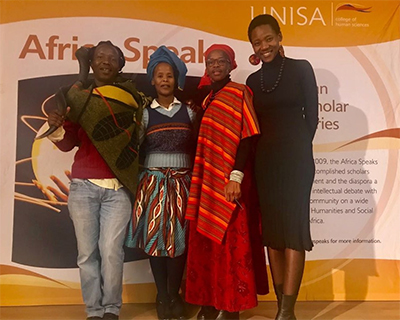
Pictured are Mpho Molikeng (traditional Sesotho musician), Prof Zethu Cakata (Associate Professor: Department of Psychology), Mmatshilo Motsei (founding director of Africa Ikalafe, author, social entrepreneur and healer), and Prof Puleng Segalo (Head for the Office of Research and Graduate Studies in the College of Human Sciences).
“Land is the greatest heritage of African people. The health and wellbeing of the people is intertwined with the health and wellbeing of the land,” said Mmatshilo Motsei, when she delivered the recent Africa Speaks lecture hosted by the College of Human Sciences.
One of the most promising projects, started in 2008 in the College, the African Visiting Scholar Lecture Series, is an innovative series established by former Dean, Prof Rosemary Moeketsi. Its goal is to achieve a number of objectives aimed at improving the research capacity of the College and enhancing a critical discourse by its academics with African intellectuals on the African continent and in the diaspora.
Currently overseen by Prof Puleng Segalo, head for Graduate Studies and Research in the College, the vision of Africa Speaks is to nurture, develop and sustain a vibrant community of researchers and intellectuals in the College connected to the African continent and diaspora so that we can continue to be innovative in our quest for truth and our contributions to universal knowledge and the transformative needs of a developmental African state.
In delivering the latest lecture, Motsei, founding director of Africa Ikalafe, author, social entrepreneur and healer, spoke on No Land, no prayer: A review of land as a spiritual asset. Her topic looked at indigenous people and how they relate to land in a way that transcends the physical. For instance, from the time they are born, babies are rooted in their ancestral land by means of a ritual of burying the placenta. From birth till death and beyond, land represents people’s spiritual and economic livelihood.
Because African spirituality is inseparable from the secular, agricultural productive capacity cannot be divorced from healing people’s relationship with the natural and supernatural. In the words of John Mbiti, Motsei argued that “persons can hurt the earth, and the earth can hurt them. Therefore, harmony is necessary for mutual benefit”. “Our relationship with the land has undergone immense strain,” she said.
She said in South Africa, we are led by people who are not connected to the land anymore, even if they call for its return. “When we look at what is happening in the country, we see the dislocation of people from nature and land. How do we redistribute land in an economy that kills people? We make a call for return of the land without returning to who we were when in power,” she said, adding that there is a distinction between who the government is and who is in power; “Our government is not in power.”
Motsei described the land as a spiritual asset, “it doesn't open itself to private ownership, the ownership is about the ecological”. She argued that dialogue on the spirituality of land must be opened up as a way of confronting the dichotomy between policy and indigenous spirituality.
She spoke about missionaries who she said took up space on African land, and this perhaps explains the deafening silence of churches today on the land discussion. When responding to the question of whether Christianity is a curse, she said that Jesus Christ as an enlightened one is in people, “the problem comes when one organises religion, then you are not loyal to the Christ in you but to the people who run religion, the same applies to African religion.”
Motsei also spoke about how education in South Africa does not feed the cosmic mind and how it has failed our children. “Our children are not taught to be unapologetically African. We have turned our children into other people’s way of being in the world.”
One of the most poignant parts of her lecture was the relation of woman to land. Explaining that we have to look at the intersection of violence against women's bodies, the land and the environment, she said the earth is a woman, and the earth is under attack, she said. "We kill women but we want the land back. Women are attacked because they carry the seed, yet we call for the return of the land. I wonder if the EFF and Black First Land First would advocate for the preservation and care of the first land, the womb,” she said as she concluded.
* By Rivonia Naidu-Hoffmeester (CHS communications and marketing)
Publish date: 2018-06-05 00:00:00.0

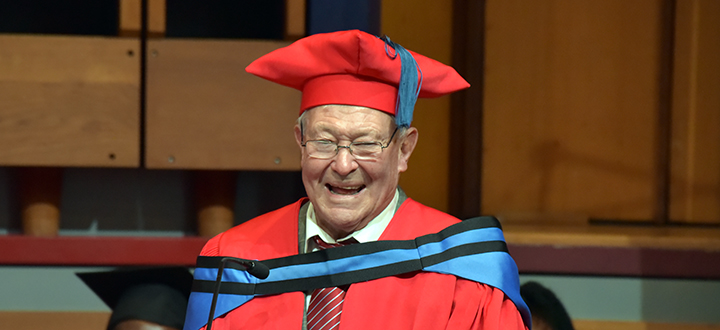 Community champion and agricultural entrepreneur extraordinaire honoured by Unisa
Community champion and agricultural entrepreneur extraordinaire honoured by Unisa
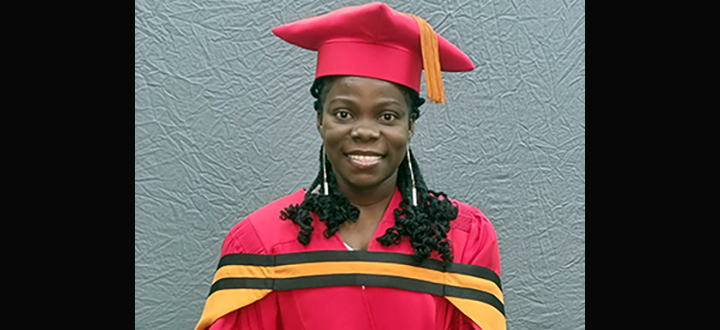 Ghanaian-born Swede earns PhD in Information Sciences from Unisa
Ghanaian-born Swede earns PhD in Information Sciences from Unisa
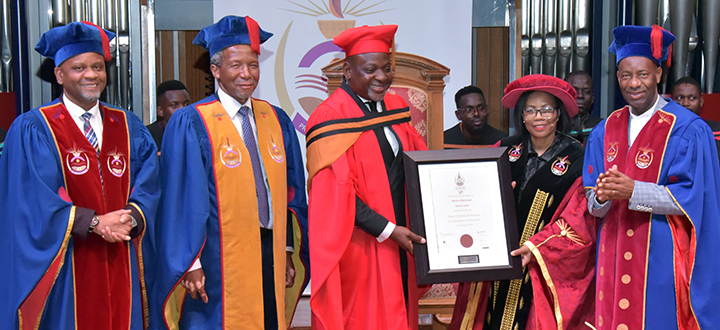 Unisa awards honorary doctorate to exemplary philanthropist and entrepreneur Collen Tshifhiwa Mashawana
Unisa awards honorary doctorate to exemplary philanthropist and entrepreneur Collen Tshifhiwa Mashawana
 Inhlanyelo Hub explores financing and sustainability at the International Conference on Business Incubation
Inhlanyelo Hub explores financing and sustainability at the International Conference on Business Incubation
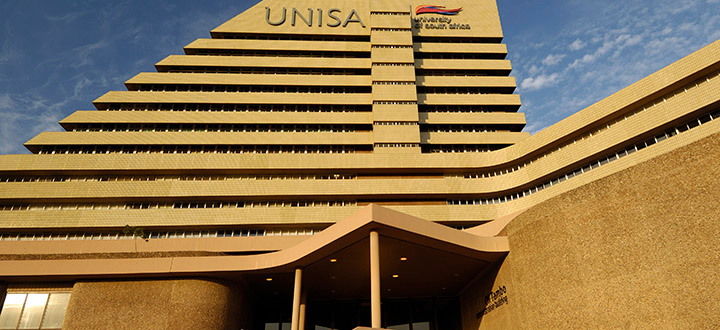 Unisa remains anchored among the waves
Unisa remains anchored among the waves